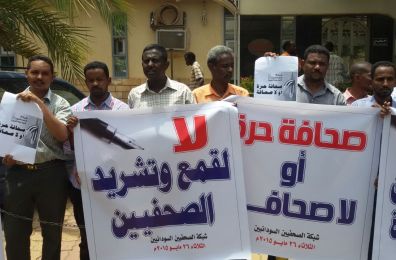Sudanese security drops its legal cases against press
November 2, 2018 (KHARTOUM) – Sudan’s National Intelligence and Security Service (NISS) on Thursday said it is dropping all legal cases it has filed against journalists and newspapers at courts.

Addressing the signing ceremony, NISS director Salah Abdalla (aka Gosh) said his agency would engage in a new phase in its relationship with the press after signing of the Press Code of Ethics.
He pointed out that the pre-publication censorship won’t be re-imposed but said the NISS would continue to censor the print runs and report any violations to the committee tasked with implementing the Press Code of Ethics.
“But we will not stand idly by if the committee fails to implement the Press Code of Ethics in letter and spirit,” said Gosh
The spy-chief also warned against what he described as an “attack” from the foreign embassies to lure the journalists, saying the NISS wouldn’t allow direct contacts to take place between the two sides.
It is noteworthy that the NISS has filed charges against a number of journalists who recently met with the European Union and U.S. Ambassadors to Khartoum to discuss press freedoms.
The Press Charter of Ethics stipulates the freedom of the press in accordance with the law. It prohibits journalists from receiving donations or subsidies locally or from abroad.
The charter also annulled arrest of journalists due to mistakes in reporting.
Sudanese newspapers complain of the far-reaching powers of the NISS which routinely punishes dailies through confiscation or suspension.
Following the lift of pre-publication censorship, the NISS started punishing newspapers retroactively by seizing copies of newspapers that breach unwritten red lines inflicting financial and moral losses on these media houses.
In February 2015, it seized copies of 14 newspapers from printing press without giving reasons.
Journalists say that NISS uses seizures of print copies of newspapers, not only to censor the media but also to weaken them economically.
(ST)
